Yunnan University overview
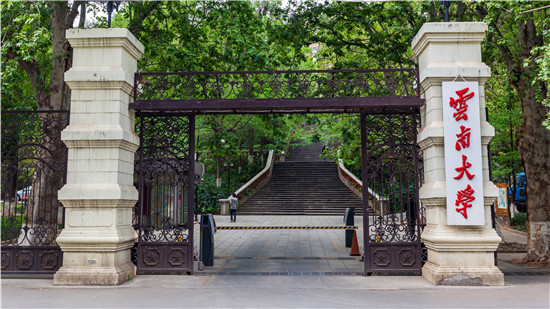
Yunnan University was founded in 1922, when it was Private Donglu University. In 1934, it was renamed as Provincial Yunnan University and in 1938 renamed as National Yunnan University. It is one of the earliest comprehensive universities in Southwest China. In 1937, when Xiong Qinglai, the well-known mathematician and educationist, served as the president, a large number of renowned scholars were employed to teach at the university, which laid foundation for its development and profound academic tradition, leading to the first glorious era in the history of Yunnan University. In 1940s, Yunnan University developed into one of the famous large universities in China with international influence and offered courses in arts, law, science, engineering, agriculture and medical science. In 1946, Yunnan University was listed by Concise Encyclopedia Britannica as one of the 15 world's famous universities in China.
In 1950s, when Yunnan University was under the direct administration of the Ministry of Education, the national faculty restructuring was introduced. Some important featured departments, like aeronautics, civil engineering, law, and railway spun off from Yunnan University and merged into colleges like Beijing Aeronautical and Astronautical Institute, Sichuan University, Southwest University of Political Science and Law and Changsha Railway Institute. Departments like engineering, medical science and agriculture were also divested from the University and gradually developed into today's Kunming University of Science and Technology, Kunming Medical University, Yunnan Agricultural University and Southwest Forestry University, etc. In 1958, the administrative management of Yunnan University was delegated from the central Ministry of Higher Education to Yunnan province. In 1978, it was ranked by the State Council as one of the 88 national key universities.
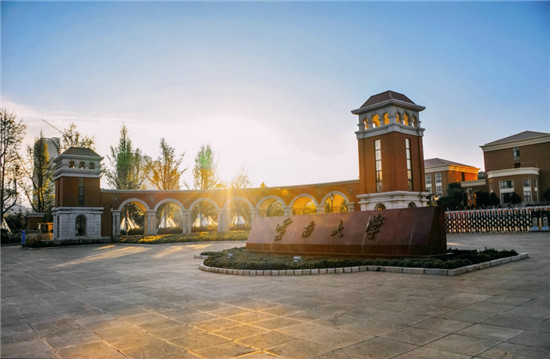
Since the reform and opening-up, Yunnan University has made huge progress. In 1996, it was among the first universities to win the membership of "Project 211". In 2001, it was listed as one of the higher education institutions to be intensively supported in China's development of its western region. In 2004, it became a key university to benefit from focused support from the People's Government of Yunnan and the Ministry of Education. In 2006, all its 19 secondary indicators were A-graded and it was rated as an excellent college for undergraduate education by the MOE. In 2012, it became a participant of the Central-western Chinese Universities Capacity-building Project, and a participant in the Central-western Chinese Universities Comprehensive Capacity Promotion Project. In 2017, it became one of the first 42 first-class universities in China. In 2018, it became one of the 14 universities in central and western China that were jointly supported by the Ministry of Education and local provincial governments.

In recent years, Yunnan University has integrated itself into the national strategy by serving the economic and social development of Yunnan. It has committed to "taking a foothold in the southwestern frontiers, serving the people of Yunnan, promoting academic strengths, and developing distinct features" and "extraordinary and frog-leaping development from a higher starting point".
Its innovative strategy to meet those goals is to emphasize talent recruitment in a highly-focused and cooperative joint development context that includes the Talent Cultivation Plan and the Action Plan of Yunnan University to Serve Yunnan Province. The "go-global" approach will allow the university to reach new academic heights and a stronger competitive position.
Yunnan University has now gathered a galaxy of talents in liberal arts, science, law, technology, economics, agriculture, medicine, business administration, and fine arts, and has developed into a modern university featuring ethnology, biology, resource development and environmental protection, borderland research, and Southeast Asia and South Asia research. According to a recent discipline ranking released by the MOE, its ethnology, ecology and political science programs rank 2nd, 6th and 10th respectively in the country. According to the 2012 Essential Science Indicators, biology and chemistry at Yunnan University were among the top one percent of the world's academic disciplines.
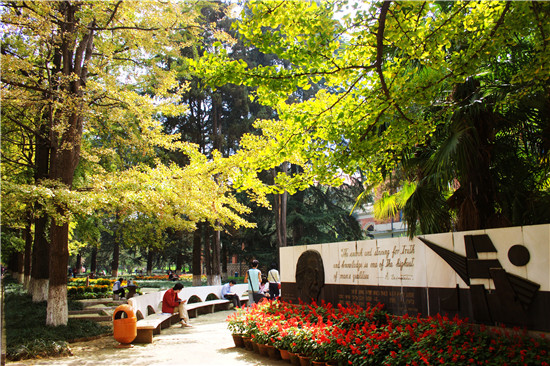
Yunnan University consists of 27 schools, 10 research institutes, one affiliated hospital and a graduate school. There are over 3,000 teaching and research personnel in professional and technical positions, among whom nearly 1,500 have doctorates. The university has nearly 17,000 full-time undergraduate students, nearly 12,000 master's degree students, over 1,500 PhD students and nearly 1,500 international students. It has 82 majors in undergraduate programs, 12 state-level featured majors, two state-level professional comprehensive pilot reform programs, 10 state-level quality courses, three state-level publicly-available quality courses. A total of 22 of its primary disciplines are authorized to offer PhDs, 42 primary disciplines offer master's degrees, and 26 disciplines offer professional master's degrees. In the fourth round of discipline evaluation conducted by the Ministry of Education, two A-level disciplines (ethnology with an A+ rating and ecology with an A-) and 14 B-level disciplines were evaluated. The university has developed into a comprehensive academic institution with a full range of disciplines and a concentration of top-flight talent -- with ethnology, ecology, biology, resource development and environmental protection, as well as studies on frontier issues and international issues in Southeast and South Asia, seen as constituting its distinctive competitive advantages and chief characteristics. It has four national bases for talent cultivation, four national experiment teaching model centers, three national training programs for excellent engineers, one national educational training center for excellent practical and inter-disciplinary legal professionals, four national innovation experiment areas for talent cultivation model as well as one national pilot software school. At YNU, there is one national international joint center, two national maker spaces, and one national college students' cultural quality education base. In addition, there are 12 Ministry of Education research centers, observation stations and education bases.
Yunnan University has 12 academicians as well as 11 selected scholars from the national High-level Talents Introduction Program, 14 especially invited professors and lecture professors from the "Cheung Kong Scholars Program" of the Ministry of Education, 14 recipients of the National Science Fund for Distinguished Young Scholars and two recipients of the National Science Fund for Excellent Young Scholars.
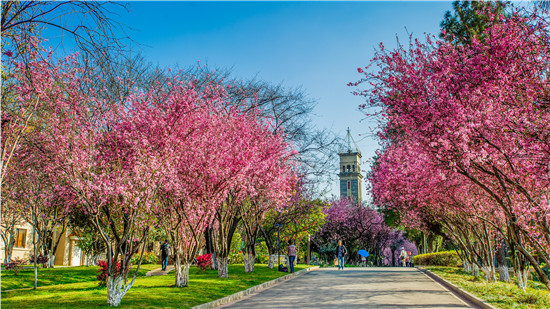
The university understands the importance of top-quality high school education and is noted for its teacher-training programs. For example, it takes part in the MOE's Supporting Program for High-School Key Teachers, and is home to a winner of the MOE's High-School Excellent Young Teacher Award. There are 20 leaders in high-school teaching and scientific research in Yunnan, as well as 20 high-school famous teacher workshops. The university has four national teaching groups, 11 provincial teaching groups, an MOE innovation group, 12 provincial innovation groups, and seven provincial high-school technological innovation groups. Yunnan University is committed to excellence at all levels of China's educational system.
It is also active in talent and innovation development and cultural training. Many of its students were selected under the National Hundred, Thousand and Ten Thousand Talent Project or the 10,000 Talents Program for exceptional young talents. Five of its faculty were named as Leading Scientific Talents in Yunnan, 10 as Yunling Scholars, and one as a Yunling Industrial Technological Leading Talent. Four of its students are recipients of the Yunnan Prosperity Talent Award, while 13 came to the university in the Program for Introduction of Overseas High-level Talents in Yunnan, 103 have been identified as young leaders in academics and technology and technological innovators in Yunnan, and 40 designated as backup young talents for leaders in academics and technology. Yunnan University hosts 12 provincial innovation groups, seven provincial high-school technological innovation groups and 15 provincial innovation groups for philosophy and social sciences. It is also home to the recipient of the 10th China Young Female Scientist Award.
The university's faculty, programs, student body and commitments come together in the various projects it undertakes.
In recent years, it has independently presided 6 projects of the 973 Plan, the 863 Plan, and 40 major bidding projects of the National Social Science Foundation and MOE humanities and social science milestone projects.
These projects have had practical effect. The university's report on the China-Myanmar Oil and Gas Pipeline helped the project start. Its achievements in Research on Cross-border Ecological Safety and International Rivers provided decision-making reference for solving issues related to water resources and the ecological health of rivers that flow across borders. Its research achievements in several projects, such as Dealing with Arsenic Pollution in Yangzonghai Lake, Ecological Rehabilitation and Dealing with Polluted Rivers and Investigation of Non-Point Source Pollution in Dianchi Lake and Controlling Measures have made key contributions to dealing with pollution in plateau lakes.
In addition to generating important practical effects, the projects have garnered many awards for the university. It has been awarded several national prizes, such as a first prize for National Natural Science Award, another first prize recognizing a National Higher Institutional Humanities and Social Sciences Outstanding Achievement and a second prize for National Science and Technology Progress, among others.
Pursuit of excellence underlies all of Yunnan University's academics. A total of 20 papers by its professors have been published in world's famous academic publications, like Nature and Science. It has also sponsored academic publications in arts and sciences like Yunnan University Journal and Ideological Front, one of 11 publications listed by the MOE in its Famous Publications Program.
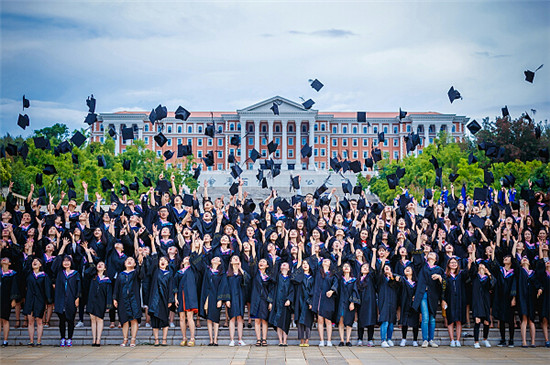
The University, covering an area of 300 hectares, is divided into Chenggong Campus and Donglu Campus, with a public floor area of more than 1,330,000 square meters, asset value of more than 1.5 billion yuan ($209.67 million) for teaching and scientific research instruments and equipment, and a collection of more than 4 million books in the library. The campus network is the main node of CERNET in Yunnan.
Looking into the future, Yunnan University will stick to its spirit of "wisdom from many, justice for all", highlighting rule of law, establishment by virtue, developing by relying on academic research and talents. It will continue to explore the formation of modern university system, enhance its academic strengths, improve its education quality, strengthen its research capacity and social services, promoting its cultural inheritance and innovation capability. It is now working hard to become a regional first-class university that is "best in China, and famous throughout the world".

All rights reserved. Presented by China Daily. 滇ICP备12004993号-2









